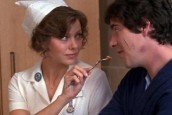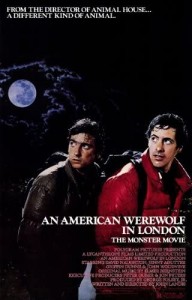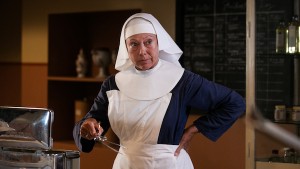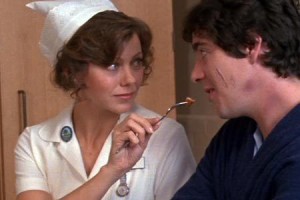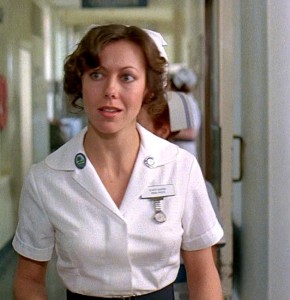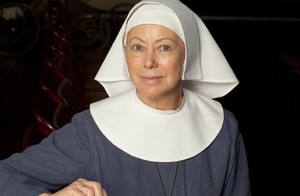In Part 3 of our exclusive interview with Jenny Agutter, she talks about the fortieth anniversary of AN AMERICAN WEREWOLF IN LONDON, in which she played Nurse Alex Price, as well as more about her ten years of portraying Sister Julienne on CALL THE MIDWIFE – Season 10 airs on PBS on Sundays – and other recent projects.
ASSIGNMENT X: Do you do much acting outside of CALL THE MIDWIFE, or do you do something else altogether between seasons?
JENNY AGUTTER: I’ve had the opportunity to do two not very big parts, but good fun parts, in Marvel films [THE AVENGERS and CAPTAIN AMERICA: THE WINTER SOLDIER], which I loved, and I would love to come back and do that again. It makes a wonderful counterpoint to playing a nun.
AX: Yes, you play a member of the World Security Council.
AGUTTER: [laughs] Exactly. I want to do more World Security Council and return with that. Otherwise, I have projects that I’ve been working on. I’ve done other films in between as well.
AX: According to IMDB, lately you’ve been in the films QUEEN OF THE DESERT, and TIN, and SOMETIMES ALWAYS NEVER. And you’re in THE RAILWAY CHILDREN RETURN. You famously starred in the 1968 English miniseries THE RAILWAY CHILDREN and the 1970 film adaptation as Roberta Faraday, when you were a child yourself. In THE RAILWAY CHILDREN RETURN, is there a younger version of Roberta, and you play the older Robera looking back, or are you the parent of new Railway Children?
AGUTTER: I’m actually the grandparent of new Railway Children. It’s a sequel, but it’s Bobbie as a grandmother to a young boy, and then the other children coming as evacuees from Manchester. It’s 1945, and during the war. It’s a lovely story, actually. So, it pays homage to Lionel Jeffries’ film, and E. Nesbit’s book. I think Nesbit would have been rather pleased with the idea that her characters then move on in time.
AX: How is it returning to a character after such a long period?
AGUTTER: It was not a big role in [THE RAILWAY CHILDREN RETURN]. It’s there really as a nod to the film that was there before, but I like the idea of taking part. Tom Courtenay took a role, which is lovely, he’s someone I’ve worked with in the past. I remember talking about it with Tom and the director, Morgan Matthews, although it’s not very obviously revealed, to have some sense of what that journey would have been for Bobbie, who we saw as a young woman at the end of THE RAILWAY CHILDREN.
I don’t know that a lot of people saw it in America, but it’s a very well-known story in the U.K., it’s like LITTLE WOMEN, and the film did extraordinarily well, so people do identify with the film, and with me in it as this young woman in 1905. So, I really had to think, what would have happened to her? My sense is that she would have become a suffragette, and she would have fought for women’s rights, because she would have been quite a strong young woman.
What was fun about that is, in a way, talking about the ten years in CALL THE MIDWIFE, in the film of THE RAILWAY CHILDREN, we’ve seen what Bobbie has been as a child, we’ve seen that her mother wasn’t able to change circumstances and finding it very difficult in a man’s world, and then we move on to the 1940s, and as a woman in that, she very clearly would be feminist in the future, [although] I don’t think that “feminist” became a term until the 1970s.
AX: Speaking of forty years in the span of Bobbie’s story, it’s the fortieth anniversary of the release of AN AMERICAN WEREWOLF IN LONDON. Do you have any thoughts about that?
AGUTTER: Yes. It’s a film that people enjoy, talk about – it has become a classic. It’s a film that I’m very proud to have done. It was a lovely role to play. I’m not a keen fan of horror movies, but it was very outside that in terms of the way it was written. It was a very well-written role. Alex falls in love with someone who happens to be a werewolf. I do recognize that an awful lot of women find themselves in relationships with a person who isn’t quite what they thought when they first entered into it [laughs]. I could identify with it. It’s also funny, and I’m thrilled that people who’ve had various versions that are coming out in DVD being reissued.
I’d like to see it on a big screen again. It really is good to see it with an audience. I remember when it came out, [writer/director] John Landis said, “We’re going to go to a theater midtown – we’re not having a premiere, but we’re going to go and see the film where people are actually watching it.” It was actually quite nerve-wracking, because I didn’t know what the audience reaction was going to be. It was very, very hot in New York, and the audience were kind of shouting at the screen at the very beginning. And then what was wonderful is that they laughed at their own reaction. Once they got caught up by the film and the story, when something happened that was frightening, you’d get these screams, and then laughter following that. It was a really fun occasion.
AX: Do you have anything else you’re working on that we should know about?
AGUTTER: I’m working on something that’s been held up somewhat by the pandemic, as a lot of things have. I was working with some young theatre-makers, called Intermission Youth Theatre, very much a London group, mainly from Caribbean and African backgrounds, to do a production of [William Shakespeare’s] THE TEMPEST. It was a documentary rather than a dramatic piece. We were going to put that play on in the U.K. first, and take that to Tobago, which I know quite well, and look at different cultures, and look at how history has affected those two places.
THE TEMPEST is a wonderful play. It examines who we are, what we are, and how we’re affected by what surrounds us. In Shakespeare’s time, the world changed. [This production] was just to explore really what we thought of the play and the ideas in Tobago, and what we thought of the ideas in the U.K. It wouldn’t have been a classical production of it; the young students were very much creating something that was about their lives, so they were updating it, and using a lot of Shakespeare text, and a lot of spoken word as well, playing with the language. So, hopefully, we’ll do that.
The other thing is tied to the Carnivale, which has classically been a part of a way to satirize and point up what’s happening in a society. In years gone by, when there were enslaved people there [in Tobago], they would [satirize] the slave masters and their families. Today, Carnivale is again showing things that are not right, and trying to change it. There are characters that look at awful historical events. There is one character called Chabjan Molassie, and he is the re-emerged spirit of a slave who was thrown into a vat of boiling molasses. So, it looks at [incidents] like that.
You wonder what the future of that place will be. Because it’s also absolutely beautiful, and is like Gonzago’s description in THE TEMPEST of “the most perfect place,” the idea of somewhere where there were no kings and queens, where there were no rules, where there were no – he goes through a list of the perfect utopian place. The big question is, is it possible for us to have Utopia? I think that we just have to work out how we can deal with the world ourselves [laughs].
AX: Did the COVID pandemic have much effect on CALL THE MIDWIFE Season 10?
AGUTTER: It’s a small season. We didn’t do eight [episodes], because we should have started in April, and the pandemic stopped everything, it was lockdown last year. So, we didn’t start until August [2020], and then we worked right through ‘til March. But we managed to get the Christmas special on in time for Christmas, and then we got the series finished by March of this year. And then we moved on to our next one. So, I’m almost rather muddled about quite where we are, because I’m almost towards the end of Series 11, having continued on to that [laughs].
AX: Do you want to stick with CALL THE MIDWIFE as long as it goes?
AGUTTER: I have always taken it year by year. I’ve always felt that if the stories remain good, and imaginative, it’s something I want to do. And they always have. So, I can see myself definitely doing next year, taking it into 12. I think, unlike EASTENDERS, CALL THE MIDWIFE is something that belongs as a complete piece of just over a decade or so anyway. That whole sense of the midwife in the community changes, and then birth control takes much more effect. So, it will not continue in the same way. You could have a series about the clinics that they started, the maternity homes they started, but not really about the nuns and their involvement.
AX: So, that began to change in the ‘70s?
AGUTTER: I think so, yes.
AX: What about the impact of the U.K.’s National Health Service, the NHS?
AGUTTER: Well, the NHS comes in at the very beginning. When we started, the NHS was in place, something the series very much celebrates and looks at. And still, in the ‘60s, where we are right now, one can see what an extraordinary job the NHS are doing. I think, even at the beginning of Season 10, there’s a little question that is between Sister Julienne and Dr. Turner [played by Stephen McGann] about privatization and charging people for midwifery services. It comes up as a possibility to make money, which Dr. Turner is very much against.
AX: And what would you most like people to know about Season 10 of CALL THE MIDWIFE?
AGUTTER: For my character, it’s a struggle. You’ll see a lot of new things happening in different medical things that are looked at, like PKU, diseases and conditions that are hidden. One of the big things that becomes central is the World Cup. So, we’ve got that in the Year Ten. There are celebrations of achievement, and there are difficulties. It examines faith with Sister Monica Joan, played by Judy Parfitt, growing older. And the other thing is that there are quite a few babies born.
Related: CALL THE MIDWIFE: Actress Jenny Agutter on playing Sister Julienne for ten years – Exclusive Interview – Part 2
Related: CALL THE MIDWIFE: Actress Jenny Agutter on new season – Exclusive Interview – Part 1
Follow us on Twitter at ASSIGNMENT X
Like us on Facebook at ASSIGNMENT X
Article Source: Assignment X
Article: CALL THE MIDWIFE: Actress Jenny Agutter on her long-running series and her thoughts on AN AMERICAN WEREWOLF IN LONDON’S 40th ANNIVERSARY – Exclusive Interview – Part 2
Related Posts:




